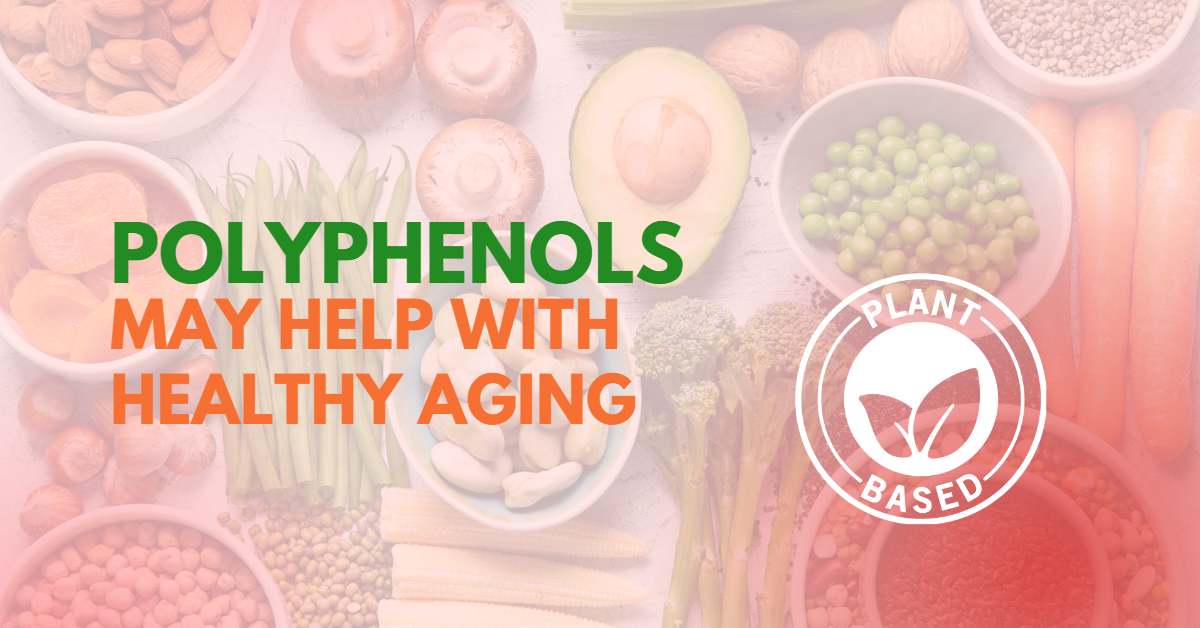Aging is a complex process that involves the progressive decline of various physiological functions, leading to an increased risk of age-related outcomes and decreased quality of life. As the world’s population continues to age, there is growing interest in developing interventions that can slow down or even reverse the aging process.
Polyphenols are a group of natural compounds found in many plant-based foods, including fruits, vegetables, nuts, seeds, herbs, and grains. Polyphenols support antioxidant systems that help to neutralize harmful free radicals and protect cells against oxidative stress. In this article, we will explore the evidence behind how polyphenols may help with healthy aging.
Key Highlights
- Polyphenols are natural compounds found in plant-based foods that support antioxidant systems and may contribute to healthy aging.
- Polyphenols may support healthy cellular function, promote gut health, preserve brain function, improve metabolic function, and maintain healthy skin.
- Certain polyphenols, such as resveratrol and green tea polyphenols, have been shown to have potential healthy aging effects, but more research is needed to fully understand the mechanisms and determine optimal dosages and sources.
Cellular Function
One of the ways polyphenols may contribute to healthy aging is by supporting healthy cellular function. As we age, our cells become less efficient at repairing damage and producing energy, which can lead to a range of age-related health issues. Polyphenols have been shown to enhance the activity of certain enzymes and proteins involved in cellular repair and energy production, potentially helping to slow down the aging process.
For example, resveratrol, a polyphenol found in grapes and red wine, has been shown to activate a protein called sirtuin-1 (SIRT1), which is involved in cellular repair and energy metabolism (1). Resveratrol has also been shown to increase the lifespan of various model organisms, such as yeast, worms, and flies (2).
Gut Health
Polyphenols may also help to promote healthy gut bacteria, which play a key role in maintaining overall health and vitality. The gut microbiota is a complex ecosystem of microorganisms in the digestive tract, and it is known to influence many aspects of health, including immune function, metabolism, and brain function.
Research shown that certain polyphenols, such as those found in green tea, berries, and cocoa, can help to increase the abundance of beneficial gut bacteria and reduce the growth of harmful pathogens (4). Polyphenols may also help to improve the integrity of the gut barrier, which can support immune function (5).
Brain Function
Polyphenols may also have neuroprotective effects, potentially helping to preserve cognitive function and prevent age-related declines in brain health. Some polyphenols, such as those found in citrus fruits, have been shown to support cognitive function in healthy adults (6).
Resveratrol has also been shown to have neuroprotective effects by protecting against neurodegenerative outcomes (7). Human studies of resveratrol have demonstrated cognitive support (8).
Metabolic Function
Polyphenols may play a role in promoting healthy metabolism and weight management, which are important factors in maintaining overall health and vitality as we age. Certain polyphenols, such as resveratrol, have been shown to improve metabolic function and increase energy expenditure in animal studies (9). Other polyphenols, such as those found in green tea, onions, and apples, have been shown to support insulin sensitivity and glucose regulation in human studies (10).
These effects may be due in part to the ability of polyphenols to activate certain signaling pathways involved in metabolic regulation, such as the AMP-activated protein kinase (AMPK) pathway (11). Activation of this pathway has been linked to insulin sensitivity, glucose metabolism, and energy expenditure (12).
Skin Health
Polyphenols may also play a role in maintaining healthy skin, which can be particularly important as we age. The skin is the body’s largest organ and is subject to a range of environmental stressors, such as UV radiation, pollution, and oxidative stress. These stressors can lead to skin damage and contribute to the development of wrinkles, fine lines, and other signs of aging.
Green tea polyphenols have been shown to have photoprotective effects, helping to protect the skin against UV radiation and other environmental stressors, while helping improve skin hydration and elasticity, potentially reducing the appearance of fine lines and wrinkles (13).
Polyphenols are a diverse group of natural compounds found in many plant-based foods, and they have been shown to have a range of potential health benefits, including anti-aging effects. By supporting healthy cellular function, promoting gut health, preserving brain function, improving metabolic function, and maintaining healthy skin, polyphenols may help to slow down the aging process and reduce the risk of age-related outcomes.
While more research is needed to fully understand the mechanisms behind these effects and to determine optimal dosages and sources of polyphenols, the evidence to date suggests that incorporating polyphenol-rich foods into the diet may be a simple and effective way to promote healthy aging.
References:
- Sinclair DA. Toward a unified theory of caloric restriction and longevity regulation. Mech Ageing Dev. 2005 Sep;126(9):987-1002..
- Kaeberlein M, Rabinovitch PS. The aging paradox: two sides of the same coin. Ann Rev Gerontol Geriatr. 2013;33:33-58.
- Del Rio, D, Rodriguez-Mateos A, Spencer, J P, et al. Dietary (poly) phenolics in human health: structures, bioavailability, and evidence of protective effects against chronic outcomes. Antiox Redox Signaling. 2013,18(14):1818-1892.
- Anhe FF, Roy D, Pilon G, et al. A polyphenol-rich cranberry extract protects from diet-induced obesity, insulin resistance and intestinal inflammation in association with increased Akkermansia spp. population in the gut microbiota of mice. Gut. 2015;64(6):872-883.
- Yuan M, Chen X, Su T, Zhou Y, Sun X. Supplementation of kiwifruit polyphenol extract attenuates high fat diet induced intestinal barrier damage and inflammation via reshaping gut microbiome. Front Nutr. 2021;8:702157.
- Kean RJ, Lamport DJ, Dodd GF, et al. Chronic consumption of flavanone-rich orange juice is associated with cognitive benefits: an 8-wk, randomized, double-blind, placebo-controlled trial in healthy older adults. Am J Clin Nutr. 2015;101(3):506-514.
- Shukitt-Hale B, Lau FC, Joseph JA, Berry K. Blueberry polyphenols attenuate kainic acid-induced decrements in cognition and alter inflammatory gene expression in rat hippocampus. Nutritional Neurosci. 2008;11(4):172-182.
- Spencer JP, Vafeiadou K, Williams RJ, Vauzour D. Neuroinflammation and its modulation by flavonoids. Endocrine, Metab Immune Disorders Drug Targets. 2012;12(4):382-388.
- Rivera L, Morón R, Sánchez, M, Zarzuelo A, Galisteo M. Quercetin ameliorates metabolic syndrome and improves the inflammatory status in obese Zucker rats. Obesity. 2008;16(9):2081-2087.
- Shahwan M, Alhumaydhi F, Ashraf GM, Hasan PMZ, Shamsi A. Role of polyphenols in combating Type 2 Diabetes and insulin resistance. Int J Biol Macromol. 2022;206:567-579.
- Hardie DG, Ross FA, Hawley SA. AMPK: a nutrient and energy sensor that maintains energy homeostasis. Nat Rev Mol Cell Biol. 2012;13(4):251-262.
- Wang S, Moustaid-Moussa N, Chen L, Mo H, Shastri A, Su R, Bapat P, Kwun I, Shen CL. Novel insights of dietary polyphenols and obesity. J Nutr Biochem. 2014;25(1):1-18.
- Heinrich U, Moore CE, De Spirt S, et al. Green tea polyphenols provide photoprotection, increase microcirculation, and modulate skin properties of women. J Nutr. 2011;141(6):1202-1208.







